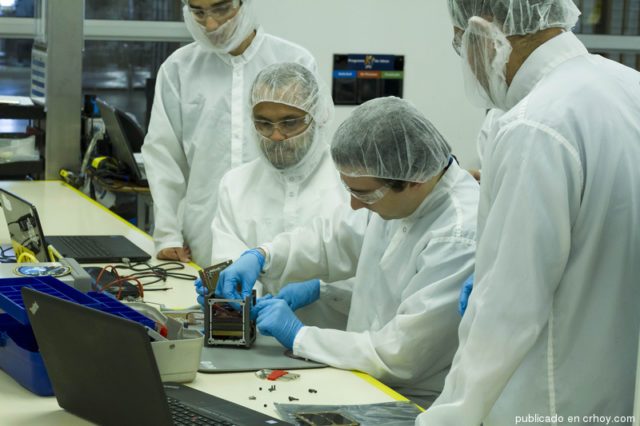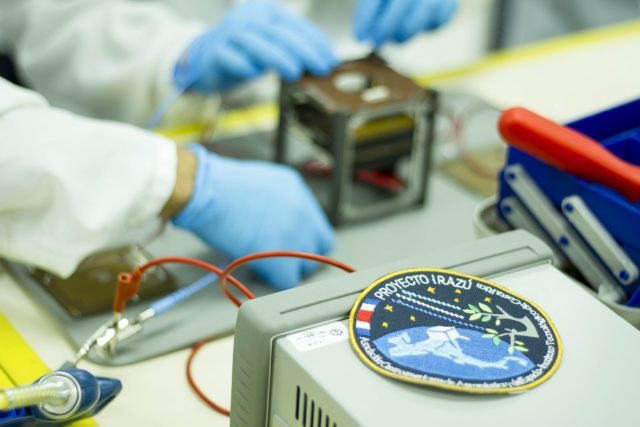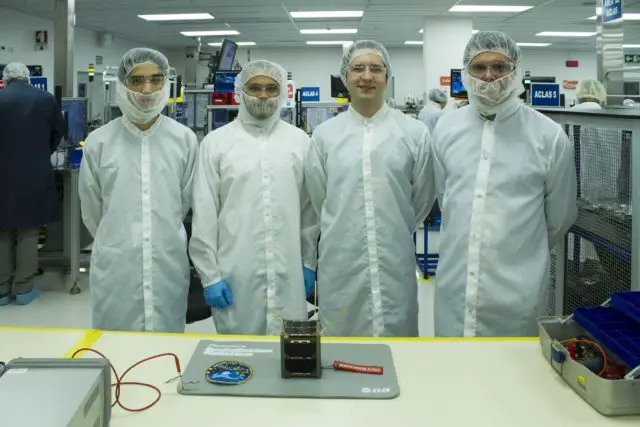| The Central American Association of Aeronautics and Space (ACAE) and the Technological of Costa Rica (TEC) announce the successful conclusion of the assembly phase of the Irazú Project, the 1st Central American satellite to go to space. This is one of the most important phases of the 1st space mission elaborated on national soil and was in charge of 4 TEC engineers, who for 3 weeks performed the verification work of the systems and assembly of the pieces, in a clean four facilitated by the company MOOG Medical, located in Zona Franca Coyol (ZFC) in Alajuela. |

Carlos Alvarado, president of ACAE said that “today is a historic day for our country and Central America. Thanks to the talent of the TEC engineers and the availability of the company MOOG, to provide us with a clean room free of charge for 3 weeks, we can officially start sending the satellite to the Kyutech Technological Institute in Japan”.
“With the Irazú Project, we are demonstrating that the national talent has the technical and professional level required to participate in the high levels of the value chain of the global aerospace industry, as well as a show of commitment on the part of all the actors of the country, to continue promoting the development of the aerospace sector in Costa Rica. From ACAE, our intention is to develop space technology to promote peace and create prosperity in the world”, he adds.
The Irazu Project satellite will now be sent to the Kyutech Technological Institute, located in Fukuoka Prefecture, Japan, where flight tests will be conducted so that the satellite will then be sent into space in the course of 2018.
Luis Diego Monge, project manager of ACAE mentioned that “once the satellite reaches the University of Kyutech, will be subjected to studies that simulate the extreme conditions of the launch and the orbital environment in the most realistic way, with the intention to check its operation and thus ensure optimum operation in space. After the satellite surpasses those tests, it will be sent to space, from the International Space Station, in the course of 2018.
Something very important of this next phase is that 2 Costa Rican students, Eng. Juan José Rojas and Eng. Marcos Hernández, who is currently studying in Japan, is also part of the scientific team that will conduct the respective tests, led by renowned scientist Dr. Mengu Cho.

The assembly procedure of the 1st Central American satellite was to be carried out in a controlled room that complied with the strictest cleaning and safety measures required by the medical devices manufactured by MOOG Medical. This ISO-8 controlled room measures the positive pressure and the maximum allowable particle size (less than 100 thousand particles per cubic foot) which monitors the percentage of humidity to avoid contaminating the parts.
Like MOOG, in the Coyol Free Zone, there are 24 leading companies in the Life Sciences industry, which together generate exports of 1,233 million US$ (25% of total exports in free zones) and 54% of sales to the exterior of medical devices in 2016. Medical solutions such as intravenous sets, breast implants, gastric bands, contact lenses, cardiovascular catheters, and other light and advanced manufacturing products produced in 1st-level controlled rooms are manufactured at ZFC.
MOOG Medical is an ISO-13485 and Carbon Neutral company in Costa Rica, dedicated to the manufacture of medical devices in the line of infusion and food products for the American and European market. Its 6,500 square-meter plants are located in ZFC since 2009.

The Irazú Project aims to develop a scientific mission that allows Costa Rican researchers to gather information and data related to the national effort to mitigate carbon monoxide (CO2) emissions through carbon sequestration in the forests.
To achieve this, the satellite will connect to a remote station located on the campus of TEC Regional Headquarters in San Carlos, where sensors will be placed to monitor the growth of the trees, which will be connected to an omnidirectional antenna and linked to the satellite twice a day, just as it passes through Costa Rica, to extract information that will be useful for estimating carbon sequestration levels.
It is also sponsored by private companies Ernst & Young S.A., Purdy Motor Group, Coyol Free Zone, and the public relations agency CCK. In addition, more than 900 Costa Ricans joined and sponsored the Project through the Kickstarter grant platform, which managed to reach the amount required to fully develop the Project.
